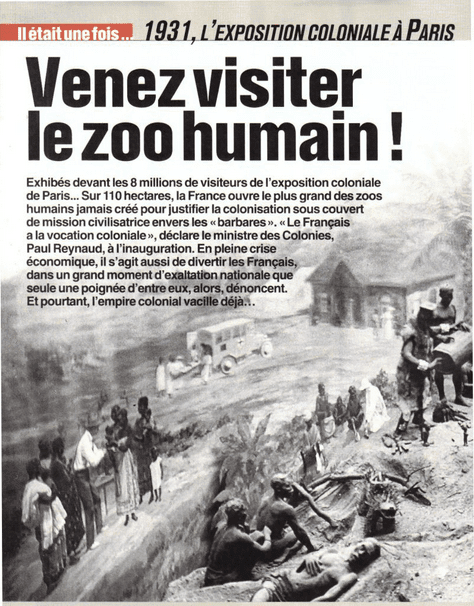The roots of France’s ascendant racism lie as deep as the origins of the French republic itself by Yasser Louati (published on July 11, 2017).
Marine Le Pen was never really the story so much as the symptom. Ever since global terrorism set the new norm in terms of a permanent threat of bombs in public spaces, mass shootings or crowd-ploughing trucks, the politics of identity has found a new source of legitimisation in France.

Muslims are now routinely portrayed as the ‘enemy within’, a term originally coined by René Gontier for Jews in the 1930s, and Le Pen and her party are far from the only ones to have supported the openly racist ideas that are legitimised by a self-declared love of nation. In March 2016, for example, Laurence Rossignol, the Socialist minister of women’s rights, compared Muslim women wearing a headscarf to ‘American negroes who were in favour of slavery’. She found widespread support, not only within her socialist government but also in left-wing presidential candidate Jean Luc Mélenchon, who had previously declared: ‘In France, we don’t wear headscarves.’
Common ‘wisdom’ would have one believe that Islamophobia is a far-right monopoly but in reality it spans the whole political spectrum in France. Indeed, one can go as far back as the mid-19th century and see the same relationship between the French republic and racial domination.
The revolution of 1848, for example, which overthrew the monarchy and reinstated the republic, did not put an end to France’s colonial enterprise – on the contrary. At the national assembly, deputy Jules Ferry, who is remembered as the father of France’s secular public schools, made his (in)famous speech calling for colonial expansion: ‘I repeat, that the superior races have a right because they have a duty. They have the duty to civilise the inferior races.’
On the ground, the dominated blacks and Arabs in the colonies of Africa and the West Indies learned the hard way what the republic stood for. With the 1848 republican constitution declaring that ‘the Algerian territory is a French territory’, the colony was divided into three departments with the right to vote being granted to white settlers only, thus paving the way for the disciplinary regime of the indigenous code of 1881.
As the Martinique-born psychiatrist and anti-colonial thinker Frantz Fanon explained, the barbarity of France’s colonial enterprise in Africa damaged both the coloniser and the colonised.
The current Fifth Republic was proclaimed with the 1958 constitution, in the midst of the bloody repression in Algeria and while France was still dreaming of keeping its grip on its colonies. But the end of colonialism brought no assessment of what had gone wrong and what lessons needed to be learned. Rather, the country entered into voluntary amnesia without addressing this poisonous legacy. Indeed, France’s ruling elite under the leadership of Nicolas Sarkozy attempted in 2005 to pass a law requiring the school curriculum to ‘recognise the positive role of the French presence overseas’. The relevant article was dropped after an uproar from academics put an end to the initiative.
Even after several generations as French citizens, Muslims still face widespread discrimination in employment, with research indicating that they are four times as likely as other applicants to be refused jobs for which they are suitably qualified. Islamophobia makes France willing to sabotage its own interests by neglecting home-grown skills and rejecting the very people it trained.
Police repression
The recent killings of Adama Traoré, Babacar Gueye, Ali Ziri, Amine Bentounsi, Liamine Dieng, Rémi Fraisse, among others, are only the latest dramatic cases of structural racist violence by the state against harmless black people and Arabs. An average of 15 people a year are killed by the police in France, two thirds of them unarmed. A recent report showed that blacks and Arabs are 20 times more likely to be the subject of police checks. Permanent police harassment has put minority ethnic neighbourhoods such as Pantin in the north of Paris in a state of quasi-occupation.
Some have dared to take their cases to court and some have even won against the state. But under the supposedly left-wing government of François Hollande, prime minister Manuel Valls and interior minister Bernard Cazeneuve did everything in their powers to protect the police by refusing to acknowledge racial profiling as a factor.
Police killings will unfortunately recur. A growing culture of urban militarisation, the extended powers the police have obtained and the unapologetically defensive attitude of the government underline the assertion of one police union representative that ‘we are going from a police state to a totalitarian one’. The head of the Bar Association of Paris has warned that current legal framework means that France ‘can switch to a dictatorship within one week’.
When, in the aftermath of the November 2015 attacks, Francois Hollande declared a state of emergency, the measures he permitted were not, in fact, so exceptional. A precedent for the hundreds of house arrests of Muslims on grounds of mere suspicion, in addition to more than 4,200 raids of which only 1.5 per cent led to terror-related inquiries, can be found in the 1958 key briefing memo by then Paris police chief Maurice Papon. A Nazi collaborator who was later convicted of crimes against humanity for his part in the round up of Jews in Bourdeaux, Papon’s memo, ‘Notes on the repression of North-African terrorism’, advocated exactly this procedure: house arrest on grounds of mere suspicion as a means of control.
President François Hollande went a step further by pushing for an amendment to the constitution to strip French citizenship from any person convicted of ‘endangering the nation’, even if they were born in France. The message was clear: people who are born, raised, educated, judged and imprisoned in France can still be foreign problems.
Bad habits
Bad habits die hard. France’s former foreign colonies have been replaced by domestic colonies. In the ‘sensitive urban areas’ (ZUS), where most of France’s minority ethnic population lives, more than a third (38 per cent) have incomes that put them under the poverty line – three times the national average. This remains triple that of the national average (13.9 per cent).
I belong to a generation of French citizens who were taught, in the country’s public schools, that France was built by white men, proud of their generosity to others. The bias was blatant but those were the rules of the game and we were expected to accept them.
As long as the country’s history is being taught only by the dominant population, the dominated remain invisible. As long as the narrative of the descendants of slaves and the formerly colonised indigenous remain in the hands of that dominant population, the country will continue to lie to itself.
France cannot come to terms with the fact that the children of immigrant Muslims have dared to look for a sense of pride and belonging in their own history. The growing visibility of politicised Muslim youth is precisely the emergence of Frantz Fanon’s ‘colonised’ who rediscover ‘this culture, abandoned, left behind, rejected, despised’ and with which they engage passionately as if to seek forgiveness.
If French Muslims are taught not to be proud of who they are but to seek the approval of the dominant population, they are right to be proud of being Muslims and for reminding France how much it owes them. No human being is to blame for refusing to trade an uncertain identity for an undeniable one.
Yasser Louati
@yasserlouati








